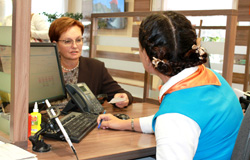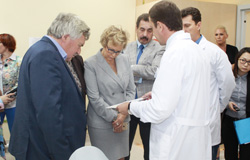
The Legislative Duma of Tomsk Oblast
CANCER MANAGEMENT: FROM HIGHT TECHNOLOGY TO RULES OF THUMB
 The Council of the Legislative Duma of Tomsk Oblast held an offsite session where the deputies discussed the renaissance of the regional cancer assistance system and the essential duty of every individual to take care of their own health.
The Council of the Legislative Duma of Tomsk Oblast held an offsite session where the deputies discussed the renaissance of the regional cancer assistance system and the essential duty of every individual to take care of their own health.
At the reception desk of the outpatient department of the Oblast Cancer Center it is very quiet. Glass walls separating visitors from receptionists have been taken off, people take their queue tickets from the ticket dispensing machine and wait for their turn. Incoming calls are taken in a separate room. Nothing distracts the medical staff from taking care of the patients. Renovated medical rooms are furnished with modern equipment.
“In the last two years cancer assistance in the region has much improved,” says Duma Speaker Oksana Kozlovskaya. “Dramatic changes took place this year and the approach has finally become clear. People used to come to the deputies and complain about rude staff, patients had to wait for months to get an oncologist appointment or have a surgery. There was a deficit of cancer drugs. This year all those problems have been solved. World class cancer care process has been set up. However, some issues still remain.”
Oksana Kozlovskaya could not walk past the issue raised by Roszdravnadzor (Russian Federal Service on Surveillance in Healthcare and Social Development) as a result of the audit of cancer pain reliever prescription practices in the regions of Russia. Both positive and negative findings were made about Tomsk Oblast. Head of regional healthcare Aleksander Kholopov answered that it was not a systemic problem.
“We followed up on all findings made by Roszdravnadzor,” he said.
He also reminded about a large scale pain management effort launched in October 2014 which included training of more than 200 doctors and about 200 nurses. It also involved setting up a pain management room in the cancer center and an awareness hotline.
The deputies also visited cancer building No. 3 in 24a Rosa Luxemburg St. which houses the department of morbid anatomy and the day patient facility.
Then they took a tour of the new radiology center. It boasts cutting edge equipment for precision diagnostics and surgical treatment of malignant growths.
 Chief Physician of the Oblast Cancer Center Lev Kudyakov described the center’s new possibilities in cancer diagnostics and treatment. However, he pointed out that whatever possibilities exist, they will never work unless the individual takes seriously their own health status.
Chief Physician of the Oblast Cancer Center Lev Kudyakov described the center’s new possibilities in cancer diagnostics and treatment. However, he pointed out that whatever possibilities exist, they will never work unless the individual takes seriously their own health status.
“There are 26 cancer sites that can be detected by visual inspection in a regular medical examination room,” he says. “People need to stay focused on regular health examinations.”
Lev Kudyakov pointed out that Tomsk Oblast has a little higher than national average cancer incidence rates.
“It is 430 cancer cases per 100,000 people. At the same time, cancer death rates are going down – 202 per 100,000 people versus 206 national average. Early detection rates have significantly improved. Hopefully, the renovated cancer assistance system in the region will continue to grow and improve.”
Summarizing the first part of the offsite session, Oksana Kozlovskaya emphasized that every individual must take good care of their health and regularly take medical examinations.
“A lot of money has been invested lately in cancer assistance. Healthy population is our priority number one as Duma deputies. But it is very important that everyone knows that the earlier they speak to the doctor the better chances are to get cured.”
Duma deputy and chair of the Oblast Duma Healthcare Committee Tatiana Solomatina is convinced that more effort must be put into improving the situation at the bottom – at the level of primary care physicians and physician assistants in rural areas. The only problem is lack of human resources.
“We have worked hard to bring our cancer assistance to world class levels. Still, a lot remains to be done in primary healthcare. There is a shortage of resources. Many physician assistants are older than 65. Thanks God, they don’t retire and keep working but we must look ahead. It is a lot of work.”
On August 17, the Duma Council will visit four districts of the region – Kargasoksky, Zyryanovsky, Molchanovsky and Krivosheinsky. The deputies will study the health examination practices in rural areas, evaluate the skills of medical staff in rural health posts, and look at the performance of central district hospitals.
After the trip the deputies will discuss their improvement proposals at the next session of the Duma Healthcare Committee.
© The State Duma of the Tomsk oblast, 2007-2025
